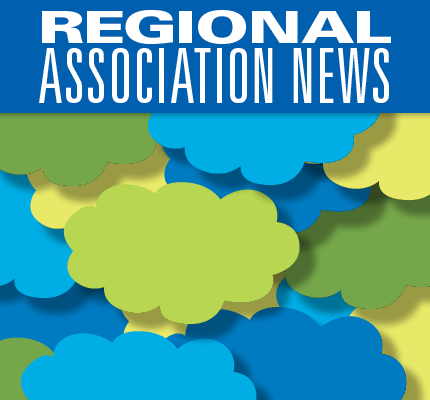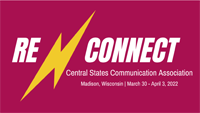
CSCA
The following CSCA awards were presented Friday, March 26, during the association’s virtual conference.
Hall of Fame
- Mike Allen, University of Wisconsin-Milwaukee
- Paul J. Siddens III, University of Northern Iowa
Communication Studies Article of the Year Award
- “Methodist Hospital’s Rhetoric of Atonement: Examining an Organization’s Response to NICU Overdoses,” Ashley Jones-Bodie, University of Mississippi
Cooper Award
- Ritika Popli, Ohio University (Ph.D.)
- Alexandra Parr Balaram, University of Wisconsin-Milwaukee (M.A.)
Federation Prize
- “Supportive communication and privacy management: An assessment of parents with children who have chronic conditions,” Kate Magsamen-Conrad, University of Iowa; Jeffrey T. Child, Kent State University; Katherine A. Rafferty, Iowa State University; and Erin Slattery, University of Iowa
Kay Award for Community Engagement and Applied Communication Scholarship
- Jimmie Manning, University of Nevada, Reno
Past Officers Debut Paper Award
- “The Moderating Influence of the Strength of Racial Identity on the Relationship Between Teacher-Student Racial Similarity-Dissimilarity and Classroom Engagement,” Md Enamul Kabir, Bowling Green State University
Pearson & Nelson Outstanding New Teacher Award
- Stevie M. Munz, Utah Valley University
States Advisory Council Outstanding Journal Award
- Iowa Journal of Communication, Kristen L. Majocha, California University of Pennsylvania (Editor)
States Advisory Council Outstanding Manuscript Award
- “‘We’re out here’: Black identity and digital resistance in Instagram travelogues,” Ohio Communication Journal, Tori Omega Arthur, Colorado State University
Warren Mentorship Award
- Sandy Pensoneau-Conway, Southern Illinois University Carbondale
Call for Papers and Panels: Re-Connect

You are cordially invited to submit competitive papers, panel discussions, and performance sessions for CSCA’s 91st Annual Convention in Madison, Wisconsin. Members are encouraged to reflect on the theme, Re-connect. It is time to come together in person after two years of very different conference circumstances. We made it through many challenges—let’s celebrate together!
Our annual conference provides us an opportunity to re-connect with one another; with where we have been in our work, our discipline, and our lives overall; and with how we create our futures. It also provides us with new opportunities: How can we forge new, more inclusive paths to expansive horizons in thought, creativity, expression, and scholarship?
As I noted in 2020-2021, Central States is a space that is reinvented every time we gather together at the conference, every time we talk with a colleague, and every time we share our research, our teaching ideas, and our very selves. We are not a perfect organization. How can we re-connect again, but anew, creating a more welcoming space for all our members?
Faculty, students, independent scholars, and community members are encouraged to submit and attend the convention. Institutional and community partnerships are particularly welcome. Submissions inclusive of all methodological perspectives in the Communication discipline are expected and embraced. Submissions that foreground the voices of marginalized groups and underrepresented scholars are especially welcome.
Watch for specific calls and submission information from each of the 27 CSCA Interest Groups, Caucuses, and Sections.
Questions about the general call or the 2022 conference:
- Contact Deb Ford, 2022 primary program planner
- DebraFord@creighton.edu.
Deadline for submissions: October 8, 2021, 11:59 PM CST.
ECA
2022 Eastern Communication Association Convention
Hyatt Regency Buffalo Hotel and Conference Center
Wednesday, April 27 - Sunday, May 1, 2022
(Re)union
Submission Deadline: October 15, 2021 11:59 (PST)
The 2022 ECA convention in Buffalo, New York will be an opportunity for (re)union! If all goes well, the 2022 convention will be our first “in person” ECA convention after two years of being unable to gather our community together. We seek to make ECA 2022 an occasion of joyous reconnection and opportunity to build new connections among our community members. We also seek to make ECA 2022 a location of reflection, deliberation, and learning as we emerge from the global pandemic and consider how we, as Communication educators and scholars, will contribute to a post-pandemic world.
We invite ECA interest groups and members to develop programming for the 2022 convention that focuses on “(Re)union” in a variety of ways, including:
- Reuniting colleagues who have similar research and teaching interests
- Reuniting colleagues who have made significant contributions through their collaborative work
- Reuniting colleagues who have shared mentorship experiences
- Building new unions within ECA to move our discipline forward
- Building new unions between ECA and the larger communities in which our members live and work
- Creating opportunities to connect around shared research and teaching interests
- Opportunities for reflection on the effects of the global pandemic on our teaching, research, and professional development and how to move forward
- Deliberation on how Communication scholars and educators contribute to a post-pandemic world
Buffalo, New York is an excellent host city for our (re)union. Buffalo is New York State’s second largest city and is known as the “City of Good Neighbors.” While in Buffalo, I hope you will make time to visit a Frank Lloyd Wright building, visit the botanical gardens, or possibly make a short trip to visit our northern neighbors. Buffalo has given our country two presidents and Ani DiFranco. Who can resist reuniting with your ECA friends to share some of those famous wings (and, yes, there are vegetarian versions)?
We look forward to our 2022 (re)union!
Pamela J. Lannutti
First Vice President
Widener University
pjlannutti@widener.edu
Nominations for Editor-Elect of Communication Research Reports
ECA will be seeking nominations or self-nominations for Editor-elect of Communication Research Reports, Volumes 40-42 (2023-2025). All candidates who meet the membership requirements set forth in the ECA Constitution are eligible to apply. The call is forthcoming. We will be seeking applicants with a wide variety of experiences. If you are interested, but think you don't have the "research record," please reach out to ECA leadership to talk through your decision before counting yourself out. Specifically, reach out to any member of the ECA Publications Committee as you consider this position.
Communication Research Reports (CRR) is published five times per year, with a specific focus on report-length manuscripts (3,500-4,000 words) and brief reports (1,500-2,000 words). CRR manuscripts are focused on social scientific research with a quantitative focus, and the journal actively encourages the submission of manuscripts demonstrating null findings, as well as manuscripts that follow open science. CRR also accepts submissions that spotlight emerging practices in Communication Studies, as well as short editorials on topics of interest to Communication scholars.
2021 Eastern Communication Association Convention
The 112th Annual ECA Convention “Resilience” was held virtually on May 24-28, 2021. The conference featured more than 600 users of the Pathable virtual conference platform and 122 first-time attendees. Other notable highlights include:
- Basic Course Conference with Keynote Speech and Workshop, presented by Pat Gehrke from the University of South Carolina, entitled “Empowering Diverse Learners with Strengths-Based Pedagogy.”
- ECA Conference Keynote Address, by Patrice M. Buzzanell from the University of South Florida, entitled "Resilience: Designing Feminist New Normals."
- James C. McCroskey and Virginia P. Richmond Undergraduate Scholars Conference Keynote, by Dannagal Young, entitled "Communication Theory Saves the World."
- Five research workshops highlighting quantitative, qualitative, and interpretive inquiry methods.
- Two fireside chats featuring Roger Bolton, President of the Arthur W. Page Society, and Ronald Jackson, University of Cincinnati.
- Graduate Poster Session.
- Graduate Programs Showcase.
The ECA 2021 Planning Team included ECA Executive Board members Amanda McKendree, Katherine Thweatt, Jennifer Waldeck, Pam Lannutti, Leeanne Bell McManus, and Stacy Smulowitz. The primary planning team included Susan Mancino, Steve Granelli, Matthew Mancino, Dawn Pfeifer Reitz, Jane Pierce Saulnier, Jordan Atkinson, Margaret Mullan, Jessica Papajcik, Rikishi Rey, and Doug Strahler. Brandon Premo and Molly Smith served as tech ambassadors for the event. Kathie Cesa shared her expertise and provided the necessary structure for conference planning and implementation.
2021 ECA Award Recipients
ECA Distinguished Service Award
- Sara Weintraub, Regis University
ECA Teaching Fellows
- Timothy Barney, University of Richmond
- Alan Goodboy, West Virginia University
- Tracey Holden, University of Delaware
- Andrew Spieldenner, California State University San Marcos
ECA Past Officers’ Award
- Megan Dillow, West Virginia University
ECA Article of the Year
- Heather M. Stassen, Cazenovia College, and Benjamin R. Bates, Ohio University, “Renewing Vows: A Diachronic Analysis of an Ideograph,” Qualitative Research Reports in Communication
ECA Centennial Scholarship
- Hannah Jones, Rutgers University
ECA Distinguished Research Fellows
- Marianne Dainton, La Salle University
- Annette Holba, Plymouth State University
Applied Urban Communication Research Grant
- Max Renner, Malloy College
2021 Richard E. Vatz Agenda-Spin Persuasion Award
- Theodore Sheckels, Randolph-Macon College
Lambda Pi Eta Top Paper
- Brooke Stanley, Northeastern University
WSCA
Next Editors for Western Journal of Communication
Casey R. Schmitt and Lisa Ellen Silvestri have been chosen as the Editors-Select for WJOC!
Casey R. Schmitt (Ph.D., University of Wisconsin-Madison) is Associate Professor of Communication Studies at Gonzaga University. Schmitt’s research explores environmental narrative and embodied action, especially in constructions of wilderness and natural spaces, as well as the social import of folk narrative, representations of indigenous Americans, and popular culture. Schmitt is the author of over two dozen peer-reviewed articles and chapters, including essays in the Western Journal of Communication, Environmental Communication, and Cultural Analysis, and is co-editor of Standing Up, Speaking Out: Stand-Up Comedy and the Rhetoric of Social Change (Routledge, 2017) and Water, Rhetoric, and Social Justice: A Critical Confluence (Lexington, 2020). Schmitt has served on the editorial staff of multiple journals, including New Directions in Folklore, the Oral History Review, and Western Folklore.
Lisa Ellen Silvestri (Ph.D., University of Iowa) is Associate Professor of Communication Studies at Gonzaga University. Silvestri’s work bridges boundaries between rhetoric, media, and cultural studies. Silvestri’s first book, Friended at the Front, won the 2016 James W. Carey Media Research Award for pioneering cultural approaches to the study of social media. Silvestri has published more than a dozen peer-reviewed articles and book chapters in outlets spanning the discipline. In 2017, Silvestri received a $100,000 National Endowment for the Humanities Grant for her community-based initiative, Telling War, with the goal of exposing, inspiring, and engaging the Veteran voice through a variety of story forms. Silvestri’s editorial work includes serving as guest editor for Visual Communication Quarterly and the Journal of Hate Studies.
B. Aubrey Fisher Outstanding Journal Article Award Winners
Two winners were selected for the B. Aubrey Fisher Outstanding Journal Article Award: Amy Way, for the essay, “Meaning/fulness through Family: Discourses of Work among Poor and Working Class Youth,” and Lisa Flores, for the essay, “Stoppage and the Racialized Rhetorics of Mobility.”
Congratulations to both recipients! And, special thanks to the Fisher Award committee for its service.

